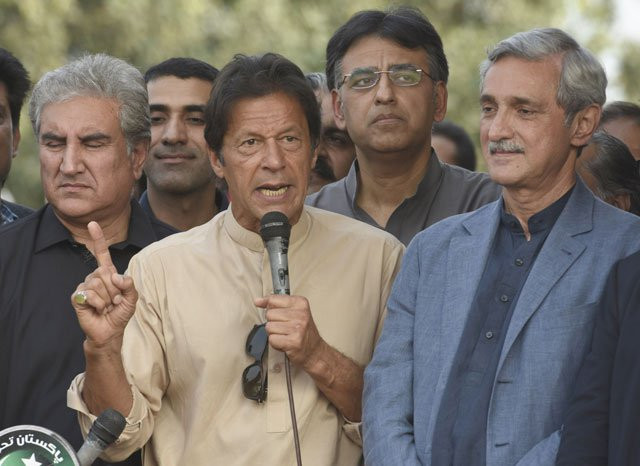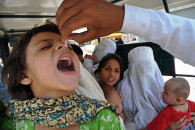A temporary respite from protest
The government’s confidence in its heavy handedness is not easily explained given their recent temerity

Imran Khan addresses media in Islamabad on Tuesday. PHOTO: EXPRESS
Like the first dharna, the real power of the protest came from the uncertainty in civ-mil relations. Uri, a “surgical strike”, Dawnleaks and the selection of a new COAS all contributed to the perceived weakness of a government being pressurised by a military in no mood to yield. This was a real incentive for the PTI to pounce, and bolstered by its impressive show in Raiwand, throwing some chaos into the vacuum could have spurred the downfall of the government.
SC gives ultimatum to PM Nawaz’s children in Panamagate hearing
But none of this came to pass. The government acted unpredictably, given its credibility haven taken a beating previously; no one believed that they would assert themselves. They did so with a decisiveness that has been wanting in them over the past few years. The PTI, used to a state that bended over backwards in their protests, were taken aback. Faced with real danger, they only had a modest coterie of the party faithful from K-P determined to make it to the capital.
The government’s confidence in its heavy handedness is not easily explained given their recent temerity. Certainly they didn’t have much confidence from the army; the forces claimed a scalp on Dawnleaks on the cusp of the protest. Neither were they assured of support from the electorate. The panic could have come from taking the extremes of the PTI’s rhetoric seriously, and likely. A dead man’s switch was pulled pre-emptively. It’s a gamble that paid off. The flip side is the government read the military’s unwillingness to intervene overtly and used the space to make a play. It leaves them both stronger and weaker – the PTI has been chastened, but the Supreme Court could, however unlikely, reverse everything.
Blocking access of a province to the capital was outrageous, as was shutting down a gathering of youth at a shadi hall. Even if the government had decided to be heavy handed, this took things too far. In that show of strength, the essential weaknesses of the government was only too apparent.
The Supreme Court provided sufficient face saving for the PTI to call off the protest. But it remains problematic for the PTI because the shortest route to a verdict would be an established false declaration by Nawaz in his papers, and given the evidence so far implicates his children it is far from certain this will happen. If it is to be properly investigated and the money trail established for something that goes back two decades, the wait will be long.
Imran Khan doesn’t wait. His standards of evidence are watery, where allegation is proof. A tendency to rely on courtiers mad of wax, as his own ears are, compound his world view. The courts are not an institution he trusts unless the verdicts favour him. What could make things move along speedily is if the evidence gathered by the PTI is compelling, but given their track record in doing so on other issues, that is not probable.
SC asks PTI, govt for ToRs to form Panamagate commission
The PTI’s greatest strength and liability both lie in Imran. He commands compelling loyalty from his followers because of his reputation for fiscal integrity, he exerts a reality distorting effect on them. But his own capriciousness and insularity is what is preventing the party from growing institutionally. He opened his doors for “electables”, but not his mind to their experience. There have been multiple opportunities for the PTI to learn from the failures of its lofty ambitions, from its workers and representatives. With every failure there was some semblance of soul searching before abrupt launches of new gambles. The “we will now concentrate on K-P" has become the emptiest of fallback mantras, even though it is most necessary.
And herein lies the rub; this is but a temporary respite from this type of disruption. Barring the unlikely scenario that the Supreme Court takes a major decision, the kind of opportunity that Imran sensed with this lockdown protest will continue to manifest itself with the further scalps the Army wants for the Cyril story – lending credence to the criticism that Nawaz is a security risk.
Nawaz is a security risk, but mostly to himself. His career is filled with self-felling errors, like the Musharraf trial, keeping things close to his chest and delaying decisions like the announcement of the new chief. Imran is right to be indignant about the Panama Papers, but indignation is Pakistan’s most plentiful resource, preparation it’s most scarce. Imran chooses the container, when what he needs to choose is to be strategically constrained.
Imran’s appeal to the masses is to take the Panama Papers more seriously than they have, a belief bolstered by the resignation of the Icelandic Prime Minister – but behind that high profile case is that of many other countries where named elected officials continue to hold office despite the scandal. That’s a reflection of the real politic, relative institutional strength, personal political capital and weaknesses in political culture of individual countries. Pakistan is no Iceland; moral authority does not compel the political system as much as accrued power does. In such a case getting the Courts to adjudicate makes sense for the PTI, and is indeed a victory given the PML-N's popularity.
PM Nawaz defaming army, claims Imran Khan
But all of this serves as perverse incentivisation; the government doesn’t respond unless a crisis inducing protest is called, compounded by the PTI not giving parliament its due as a forum where such issues can be resolved. PTI’s inability to muster the numbers for street power will keep orienting it towards institutions making its kill for them, be it military or judiciary.
The government for its part, and the rest of its term should take the possibility of further protest for granted. It needs to find a dominant narrative of explaining how it will deal with protest rather than having scattered bruisers calling out Imran, furthering the sense of instability. One would imagine they would have put this in place after the first dharna. Even if this blows over, they need to be ready for another effort against them in the run-up to the elections when the PTI, if true to form, will have heightened demands to provide a level playing field and impartial set up.



















COMMENTS
Comments are moderated and generally will be posted if they are on-topic and not abusive.
For more information, please see our Comments FAQ